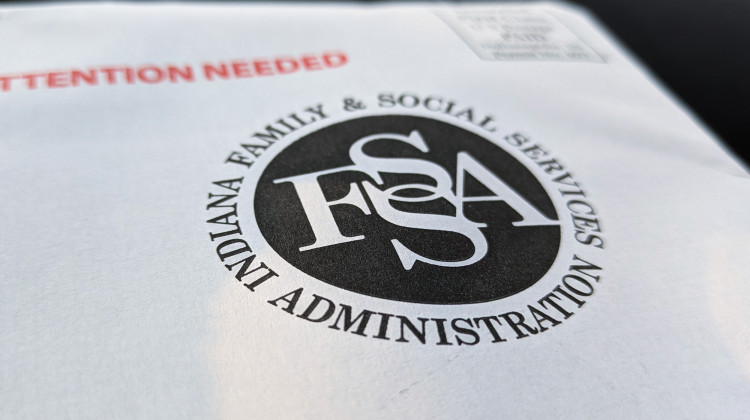
Advocates say members should carefully read any mail or notice from the state or their managed care entity.
Lauren Chapman / IPB NewsAdvocates say many Medicaid members are confused about how their coverage has been affected by a ruling that vacated the federal approval of the Healthy Indiana Plan, or HIP. The ruling highlighted several policies that act as barriers to coverage including monthly payments required for the version of HIP with better coverage, HIP plus.
Just days before POWER account contributions were set to resume, a federal ruling was released that meant Indiana can no longer collect POWER account contributions or remove people from the program because of nonpayment.
Tracey Hutchings-Goetz, communications and policy director for the advocacy nonprofit Hoosier Action, said advocates are concerned that members may receive letters with contradicting information.
“No matter how they're messaging it, there has been a really long standing problem with the way that those notices are written, as well as how slow the communication is,” Hutchings-Goetz said.
Members can receive communication around POWER account contributions from two places: the Indiana Family and Social Services Administration or the Medicaid recipient’s managed care entity. Hutchings-Goetz said this can contribute to some of the confusion people have about POWER account contributions.
In July, the state said it will work with the insurance companies that facilitate the program to communicate with members that they do not have to make these payments due to the ruling. Some members said they have not received any notices or letters explaining what is happening as a result of the ruling.
Hutchings-Goetz said members should carefully read any mail or notice from the state or their managed care entity.
“Out of an abundance of caution, if you do receive a notice to contribute to a POWER account, you may want to consider doing it, if you can afford it, just to prevent any potential mishaps,” Hutchings-Goetz said. “But it should not be an excuse to kick you off the program, or knock you down to HIP basic.”
Hutchings-Goetz said members should reach out to FSSA or their managed care entity directly if they have questions. If they are still confused or need assistance, she said health care navigators are available around Indiana.
“There's a set of community organizations across the state who are committed to helping make certain that Medicaid members get and state covered, even as things are in a liminal period right now,” Hutchings-Goetz said.
Hutchings-Goetz said she wants to reassure members that there are resources available to them.
“We do have a set of advice for members, including documenting everything, reaching out to Indiana Legal Services,” Hutchings-Goetz said. “We have a set of explainers about how to navigate Medicaid appeals on our website, on our YouTube page. And you do have rights, if you experience any disruptions to your coverage.”
READ MORE: Healthy Indiana Plan lawsuit ruling just in time to prevent Medicaid loss, advocates say
Join the conversation and sign up for the Indiana Two-Way. Text "Indiana" to 765-275-1120. Your comments and questions in response to our weekly text help us find the answers you need on Medicaid and other statewide issues.
Earlier this week, 14 community organizations, including Hoosier Action, also signed onto a letter to FSSA urging the agency to maintain HIP Plus coverage for all members — something it has done for the past four years during the COVID-19 public health emergency.
In July, Indiana filed a motion to stay and said unless the ruling was halted they would have to start transitioning members to different packages, which offer less benefits and coverage. The state also filed to appeal the ruling.
“The state’s proposal to reduce health care coverage for hundreds of thousands of Hoosiers threatens the health and economic well-being of those in our state who can least afford it,” the organizations wrote in the letter to FSSA. “This proposed policy by the state also threatens to destabilize our healthcare system and harm providers by reducing the number of services covered.”
Hutchings-Goetz said it seems like the state is holding member’s health care coverage hostage unless it is given the authority to reinstate HIP with the policies outlined in the ruling.
“Being punitive and threatening people's health, it's not an effective way to run a public health program,” Hutchings-Goetz said.
However, Hutchings-Goetz said it is unlikely Indiana will be able to actually get rid of HIP because of how many hospitals, providers and employers rely on Medicaid.
“HIP is an essential part of our state health care infrastructure, and Indiana really can't work without it,” Hutchings-Goetz said. “It's really incumbent on FSSA to figure this out in a way that keeps as many people covered and enrolled in this high quality program that was working very effectively without POWER accounts for the last four years.”
Other Medicaid programs are not affected by the ruling. Cost-sharing, including copayments and premiums, for the Children’s Health Insurance Program, or CHIP, and MEDWorks will resume as planned.
Abigail is our health reporter. Contact them at aruhman@wboi.org.
 DONATE
DONATE







 Support WFYI. We can't do it without you.
Support WFYI. We can't do it without you.